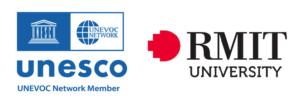
Banner Image: Chang Duong via ‘Unsplash’.
The Project

We partner with government, industry, and the not-for-profit sectors to lead applied and research-based activities that are fundamentally framed by the agenda set by the UN Sustainable Development Goals. Announced by the UN General Assembly in 2015, the Sustainable Development Goals are a set of 17 goals and 169 targets that are intended to provide a roadmap for global action across the 15 years to 2030. SDGs 4, 5 and 8 are particularly relevant to the work that we do:
Goal 4: Quality Education for All – Ensure inclusive and equitable quality education and promote lifelong learning opportunities for all
Goal 5: Gender Equality – Achieve gender equality and empower all women and girls
Goal 8: Decent Work and Economic Growth – Promote sustained, inclusive and sustainable economic growth, full and productive employment and decent work for all
The Challenge
The SDGs promote a transformative vision of a world free of poverty, violence, disease and want, a world ‘where all life can thrive’. However, in devising the SDGs, the UN General Assembly noted that there are ‘immense challenges to sustainable development’. While poverty, gender and economic inequality, unemployment and humanitarian crises continue to limit the prospects for sustainable and inclusive development, the UN GA suggests that ‘climate change is one of the greatest challenges of our time and its adverse impacts undermine the ability of all countries to achieve sustainable development…the survival of many societies, and of the biological support systems of the planet, is at risk’.
With these challenges in mind, and with a sense that ‘business-as-usual’ is not an option in times of crisis and disruption, our work is focused on an applied program of research in the following areas:
1. Young people, 21st Century capabilities, and transitions in the future of work.
2. Building a networked approach to enabling and capturing social value in learning and training;
3. Exploring educational ecologies of well-being, resilience, and enterprise.
Outcomes
Mechanisms that capture and incorporate student voice into vocational education and training design: Strategies, tools and approaches
This Report provides a comprehensive review of the research literature on the challenges and opportunities around capturing and incorporating student voice into vocational education and training design. Student voice is about recognising students’ distinctive views about their educational experiences and affording students opportunities to engage with and influence vocational education policies and curriculum by responding to their feedback and insights (Cook-Sather, 2006). Student voice, therefore, enables students, staff and other stakeholders in the vocational education and training (VET) sector to listen to and involve students in the decision-making processes and design of the curriculum.
In this report we examine student voice mechanisms at three levels:
- The macro-level concerns national policy commitments and arrangements in large scale states (including populations of 15 million or more people).
- The meso-level concerns policy commitments and arrangements in small to mid-level states (including populations of less than 15 million people).
- The micro-level is mainly concerned with institutional level policies and arrangements (including small regions or municipalities).
The Social Vocational Value and Outcomes of the New South Wales School Infrastructure Traineeship Program for Trainees
This Report presents the findings of research conducted to evaluate the NSW government’s Infrastructure Traineeship Program (ITP) for trainees from a diversity of backgrounds. The ITP offers Certificate IV courses relevant to the infrastructure and construction industry drawn from VET programs such as project management, business, and procurement and contracting. The program is managed through Group Training Organisations (GTOs) and delivered through Registered Training Organisations (RTOs). The report presents:
● a comprehensive review of the research and policy literature;
● describes and analyses evidence gathered from trainees and industry stakeholders (via surveys and semi-structured video-based interviews);
● and presents an evaluation of the social and vocational value and outcomes of the ITP for a variety of stakeholders, including young trainees from a diversity of backgrounds, and business, training providers, and government agencies and departments.
Mechanisms that capture and incorporate student voice into vocational education and training design: Strategies, tools and approaches (FINAL REPORT)

 Dr Seth Brown
Dr Seth Brown Dr Scott Phillips
Dr Scott Phillips